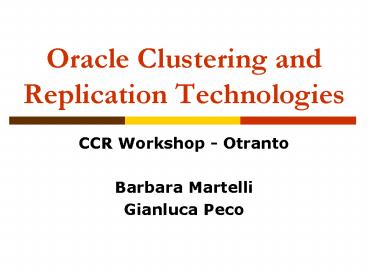Oracle Clustering and Replication Technologies - PowerPoint PPT Presentation
1 / 25
Title:
Oracle Clustering and Replication Technologies
Description:
HBA Qlogic Qla2340 Brocade FC Switch ... HBA Qlogic Qla2340 Brocade FC Switch. Disk storage formatted with OCFS2. 8 June, 2006 ... – PowerPoint PPT presentation
Number of Views:189
Avg rating:3.0/5.0
Title: Oracle Clustering and Replication Technologies
1
Oracle Clustering and Replication Technologies
- CCR Workshop - Otranto
- Barbara Martelli
- Gianluca Peco
2
Oracle Database Architecture
- The Oracle Server architecture can be described
in three categories - User-related processes
- User Process
- Server Process
- Logical memory structures
- that are collectively called
- an Oracle instance
- Physical file structures that are
- collectively called a database
Database
3
(No Transcript)
4
Instance
Database
5
Oracle Real Application Cluster
- The Oracle Real Application Cluster technology
allows to share a database amongst several
servers - All datafiles, control files, PFILEs, and redo
log files in RAC environments must reside on
cluster-aware shared disks so that all of the
cluster database instances can access them. - RAC aims to provide highly available, fault
tolerant and scalable database services
Database servers
Network shared disks (Cluster Filesystem)
6
RAC testbed
Disk I/O traffic
Fiber Channel Sw
ORA-RAC-01
GigaSw1
ORA-RAC-02
Private network for interconnect traffic
ORA-RAC-03
IBM FAStT900 FC RAID Controller
ORA-RAC-04
1.2 TB RAID-5 disk array formatted with OCFS2
Public and VIP Network Interface
4 x Dual Xeon 2.8 GHz 4 GB RAM Red Hat Enterprise
4 on RAID-1 disks 2 x Intel PRO1000 NICs 1 QLogic
2312 FC HBA with 2 x 2Gb/s links
GigaSw2
Clients
Clients
Clients
7
RAC Test AS3AP 1-4 nodes
Select Query 1GB cache
8
Overview
RAC Test AS3AP 1-4 nodes
- Summarize the main plans
- Explain the long-term course to follow
Select Query 8GB no db cache
9
RAC Test OLTP 1-2-4 nodes
4 nodes
With OLTP applications, system scalability is
lower, we argue there is a disk subsystem
bottleneck
2 nodes
1 node
10
RAC Test OLTP 4 nodes
TransactionPerMinute workload OLTP O_DIRECT
enabledASYNC_IO enabled
TransactionPerMinute workload OLTP O_DIRECT
DisabledASYNC_IO Disabled
11
Oracle Streams
- CAPTURE
- Streams captures events
- Implicitly log-based capture of DML and DDL
- Explicitly Direct enqueue of user messages
- PROPAGATION
- Captured events are published in the staging area
- Streams publishes captured events into a staging
area - Implemented as a queue
- Messages remain in staging area until consumed by
all subscribers - Other staging areas can subscribe to events in
same database or in a remote database - Events can be routed through a series of staging
areas - Transformations can be performed as events enter,
leave or propagate between staging areas
12
Oracle Streams
- Comsumption
- Staged events are consumed by subscribers
- Implicitly Apply Process
- Default Apply
- User-Defined Apply
- Explicitly Application dequeue via API (C,
Java) - The default apply engine will directly apply the
DML or DDL represented in the LCR - apply to local Oracle table
- apply via DB Link to non-Oracle table
- Automatic conflict detection with optional
resolution - unresolved conflicts placed in exception queue
- Rule based configuration expressed as WHERE
clause
13
Streams Replication Example
User executes an update statement at source
node update table1 set field1 id3 where
table1id id1
Update table1 set field1value3 where
table1idid1
table1
Source Node
Destination Node
Redo Log
14
(No Transcript)
15
Oracle Streams in 3D
- The Oracle streams allows connecting single
tables or complete schemas in different databases
and keeping them up to date at Real Time.
16
(No Transcript)
17
(No Transcript)
18
(No Transcript)
19
(No Transcript)
20
LFC Replication testbed
- 40 lfc clients, 40 lfc daemons threads, streams
pool. - Clients actions
- Control if LFN exists into the database
- Select from cns_file_metadata
- If yes -gt add a sfn for that lfn
- Insert sfn into cns_file_replica
- If not -gt add both lfn and sfn
- Insert lfn into cns_file_metadata
- Insert sfn into cns_file_replica
- For each lfn 3 sfn are inserted
21
LFC Master HW Configuration
Gigabit Switch
Gigabit Switch
Dual Xeon 3,2GHz,4GB memory 2nodes-RAC on Oracle
10gR2 RHEL 4 kernel 2.6.9-34.ELsmp 14 Fibre
Channel disks (73GB each) HBA Qlogic Qla2340
Brocade FC Switch Disk storage managed with
Oracle ASM (striping and mirroring)
Private LHCB link
Private LHCB link
rac-lhcb-02
rac-lhcb-01
ASM
Dell 224F 14 x 73GB disks
22
LFC Slave Configuration
- LFC Read only replica
- Dual Xeon 2.4, 2GB RAM
- Oracle 10gR2 (oracle RAC but used as single
instance) - RHEL 3 kernel 2.4.21
- 6 x 250GB disks in RAID 5
- HBA Qlogic Qla2340 Brocade FC Switch
- Disk storage formatted with OCFS2
23
Performance
- About 75 transactions per second on each cluster
node. - Inserted and replicated 1700k entries in 4 hours
(118 insert per second). - Almost real-time replica with Oracle Streams
without significant delays (ltlt 1s).
24
CPU load on cluster nodes is far from being
saturated.
25
Conclusions and Future Plans
- RAC technology is a good solution for scalability
at DB server level. Some work is needed to tune
the installation and optimize performance for a
particular application. Moreover a reliable and
scalable storage subsystem is needed. - Streams based replication is a good solution for
scalability at grid level, a reliable DB
infrastructure has to be distributed across many
sites. - First LFC replication test results demonstrate
that Streams is an interesting solution for
real-time master/slave replication. - VOMS replication tests in the very near future.
- Many thanks to Vincenzo Vagnoni, Eva da Fonte
Perez.































